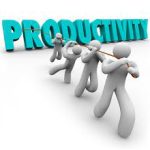Employees with a clear focus on Personal Productivity can motivate themselves to get employees with irreconcilable differences to work in sync with one another, keeping in mind their own goals of increasing productivity and efficiency.
The reason it works is because these employees learn to see beyond personal equations and try to achieve personal milestones while still being a part of a team. Every employee works in an organization to earn his due, however if an employee sees that his company is willing to appreciate his hard-work in the form of a reward, then he will be more than happy to put up with someone who he doesn’t personally like, all so that gets what he deserves.

To work together with people with differing opinions towards realizing a common goal, it’s imperative that an employee gets a clear job description drawn by the management. It’s important to also know about job responsibilities, scope of work, and purpose.
The management too must check if the employee is performing as per expectation, or if he needs any intervention and if the project is going as per schedule or more resources are needed. In case more resources are needed, this will give plenty of time to the managers to hire and train new recruits.
The success of every business depends on proper planning, goal-setting and objectives-handling. However, at a personal level, planning for a project and setting the goals helps an employee identify his strengths and weaknesses, and the areas of his possible contribution in the workforce. That’s why successful performers always draw short-term goals for themselves, along with long-term ones, so that they can check the achievability of these short-term goals, and change their strategy.
What does a Good Performer do?
Although many companies employ managers to encourage personal productivity in their workplaces by sharing progress-charts and performance feedback, it can only be done at an individual level. The job of an employee is to make sure that his individual performances are all doing justice to his potential.
Most of employees are aware that their performance is evaluated many times over the period of a year. This includes their probation period, which typically lasts for 2-3 months during which the employee receives training on the product. After the probation, he is assigned a project and he continues to work on it.
If he is a good performer, then he will realize that during this period, till he completes 12 months of employment with the organization, his performances, behavior, attitude, and many other things will be observed. Although timely feedback will be provided, an ambitious employee will always make sure that he starts on the right foot. To achieve this, he needs to have a clear and constant two-way communication with his supervisors to make them understand what stage of the work he is at, whether there are any areas that he needs help with, and if he is going good.
In addition to this, he might also have a word with the rest of the employees, and offer them valuable inputs and suggestions on they can handle the challenges they are facing. A good performer will not only improve his performances, but also try on improving the team’s knowledge, skills, and their attitude towards work through knowledge-sharing, assisting, and helping them draw self-goals.


